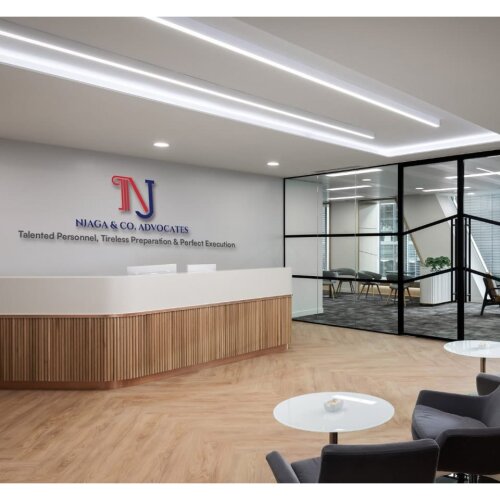About Merger & Acquisition Law in Kenya
In Kenya, Merger and Acquisition (M&A) law is a sophisticated area of legal practice that involves the consolidation of companies or assets. It is governed by several pieces of legislation and regulatory bodies, including the Competition Act, the Companies Act, and oversight by the Competition Authority of Kenya (CAK). The M&A process in Kenya can be complex, involving due diligence, negotiation, and compliance with local laws. The objective is to ensure fair competition and protect the shareholders' interests while fostering economic growth and development.
Why You May Need a Lawyer
Engaging a lawyer in Mergers & Acquisitions can be crucial for several reasons. Whether you are buying, merging, or selling a company, legal counsel can help navigate the complexities of the transaction. A lawyer ensures regulatory compliance, structures deals effectively, conducts due diligence, and drafts comprehensive agreements. Additionally, legal experts can help resolve any disputes that arise during or after the transaction and advise on risk management strategies.
Local Laws Overview
Several key aspects of local laws are particularly relevant to M&A in Kenya:
- Competition Act: This act regulates mergers to prevent practices that may substantially lessen competition.
- Companies Act: This provides detailed guidelines for the incorporation, operation, and restructuring of companies in Kenya.
- Securities Regulation: For publicly traded companies, compliance with the Capital Markets Authority is necessary.
- Tax Laws: Understanding tax implications of the transaction is essential for structuring deals efficiently.
- Employment Law: Consideration of employment contracts and employee rights during a merger or acquisition is crucial.
Frequently Asked Questions
What is the role of the Competition Authority of Kenya in M&A?
The Competition Authority of Kenya ensures that mergers and acquisitions do not reduce competition within the market. They review and approve proposed transactions to safeguard fair market practices.
Do all mergers require approval in Kenya?
Not all mergers require approval. However, merger filings are mandatory if the combined turnover or assets of the merging entities reach certain thresholds as defined by the Competition Act.
What are the typical stages of an M&A transaction in Kenya?
Typically, an M&A transaction involves stages like strategy development, target screening, due diligence, negotiation, and integration. Each stage requires careful legal oversight.
How long typically does an M&A process take in Kenya?
The timeframe for an M&A transaction can vary greatly depending on the complexity and size of the deal, regulatory requirements, and negotiations. It may take several months to several years to complete.
Are there restrictions on foreign acquisitions in Kenya?
Yes, certain restrictions apply to foreign acquisitions, particularly regarding strategic industries. Regulatory approvals may be required to ensure compliance with national interests and laws.
What are the common challenges faced during M&A in Kenya?
Common challenges include regulatory compliance, cultural integration, valuation disputes, and managing post-merger integration effectively.
How is due diligence conducted in an M&A transaction?
Due diligence involves a thorough investigation and analysis of the target company’s financial, legal, and operational aspects to identify any risks or issues that might affect the deal.
What happens if a merger is not approved by the CAK?
If the CAK disapproves a merger, it cannot proceed. Parties involved may appeal the decision or modify the terms of the merger to address the concerns raised by the CAK.
What are the tax implications of M&A in Kenya?
Mergers and acquisitions can have significant tax implications, including capital gains tax liabilities and stamp duty. It is important to plan and structure the transaction tax-efficiently.
Can employees be laid off during a merger in Kenya?
Employees' rights are protected under labor laws. Any layoffs as a result of mergers need to comply with employment laws, and affected employees may be entitled to compensation or severance packages.
Additional Resources
Here are some valuable resources for those interested in M&A in Kenya:
- Competition Authority of Kenya: Oversees competition regulation in mergers.
- Capital Markets Authority: Regulates publicly traded companies involved in M&A.
- Law Society of Kenya: Provides a list of qualified legal practitioners specializing in commercial law.
- Kenya Revenue Authority: Offers guidance on tax issues related to M&A.
Next Steps
If you need legal assistance in mergers and acquisitions, consider the following steps:
- Identify a reputable law firm or lawyer with experience in M&A transactions in Kenya.
- Prepare all necessary documents and information regarding the transaction to facilitate informed discussions.
- Schedule a consultation to discuss your needs, expectations, and potential legal pathways.
- Consider engaging a financial advisor or accountant to complement legal advice with financial insights.
Lawzana helps you find the best lawyers and law firms in Kenya through a curated and pre-screened list of qualified legal professionals. Our platform offers rankings and detailed profiles of attorneys and law firms, allowing you to compare based on practice areas, including Merger & Acquisition, experience, and client feedback.
Each profile includes a description of the firm's areas of practice, client reviews, team members and partners, year of establishment, spoken languages, office locations, contact information, social media presence, and any published articles or resources. Most firms on our platform speak English and are experienced in both local and international legal matters.
Get a quote from top-rated law firms in Kenya — quickly, securely, and without unnecessary hassle.
Disclaimer:
The information provided on this page is for general informational purposes only and does not constitute legal advice. While we strive to ensure the accuracy and relevance of the content, legal information may change over time, and interpretations of the law can vary. You should always consult with a qualified legal professional for advice specific to your situation.
We disclaim all liability for actions taken or not taken based on the content of this page. If you believe any information is incorrect or outdated, please contact us, and we will review and update it where appropriate.

















